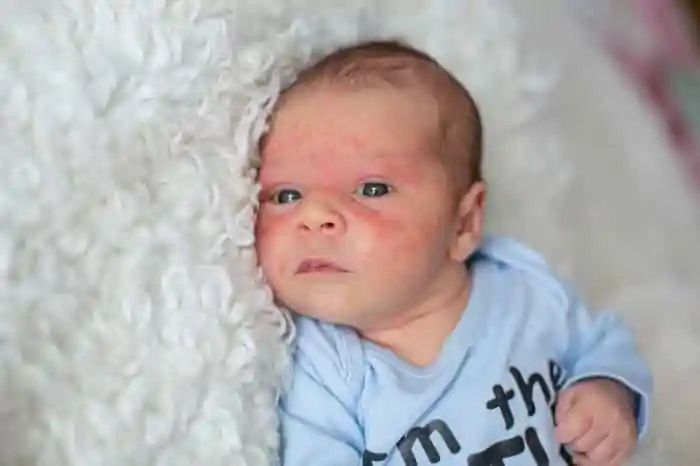
A Mommybites reader asked:
Can you go into more depth about what causes baby acne & how I can treat it?
It is common for babies, especially when they are first born, to have an “acne type” rash over their faces. Baby acne usually is on the cheeks, forehead and chin. The skin condition seems to worsen when baby is crying or upset, too.
You may notice a rash on your newborn infant what appears to look like pimples and red bumps like acne seen in adolescents. This infantile acne is due to maternal hormones that are still circulating in your baby after birth. This rash usually starts around 2 to 3 weeks of age on the face and cheeks and can continue until around 6 months of age.
Baby Acne Treatment: Getting Rid of Baby Acne
Baby Acne Breast Milk Treatment. One of the best treatments for baby acne that I have found is putting some breast milk on the affected area for 15 minutes. This usually helps the rash resolve. There is no scientific evidence to support this, but most mothers tell me this skin care solution works. Breast milk can also be used to treat cradle cap and clogged tear ducts.
Keeping baby’s face clean and dry. Baby spit up, formula and saliva seems to aggravate baby acne. So try not to have these things remain on baby’s face for too long. Use organic and perfume-free cleanser for cleaning baby; or sometimes in the beginning, just bathing your infant in water works fine. It will in most case disappear as the maternal hormonal effect diminishes.
Oils and lotions will often worsen the acne. Do not put ointments or petroleum-based moisturizers on acne because this will only worsen the rash. Baby acne will go away on its own by 6 months of age. Tea tree oil, which is sometimes recommended, is too harsh for sensitive skin, so it’s best to avoid it, or consult with a doctor or dermatologist first.
Stay with soft fabrics only. Rough fabrics can aggravate your baby’s acne or even cause infections. Dress and wash your newborn with only super-soft clothing and fabrics.
Use a mild detergent without perfumes to wash baby’s clothes so as not to irritate baby’s skin.
Healthy diet. A nursing mother needs to be on a healthy diet while breastfeeding and limit intake of high fat foods.
Mix 1 teaspoon of honey and 1 teaspoon of lemon juice. Apply to baby’s face where acne is present with a cotton ball and leave on for ½ hour. Then, rinse with warm water. This homemade, natural solution will cleanse and nourish your baby’s skin.
Read Next | When to Stop Swaddling a Baby
There are many theories of causes of baby acne. Here are some of them:
Maternal hormones during pregnancy. In utero babies are exposed to the mother’s hormones that pass through the placenta. These hormones affect the baby’s sebaceous glands causing acne, which is sometimes present when babies are born.
Maternal hormonal exposure during lactation. While breastfeeding, infants are exposed to maternal hormones, thus causing acne breakout of newborn pimples on a baby’s face.
Maternal diet during pregnancy and breastfeeding. A high-fat diet is considered in the pediatric literature a risk factor for neonatal acne.
Abrasive cleansers and washcloths can precipitate neonatal acne. Newborn skin is exquisitely sensitive and easily affected by chemicals.
Washing infants’ clothes with harsh detergents. Chemicals and perfumes can affect baby’s skin – again causing acne outbreak.
Medications. Meds that mom takes while breastfeeding can also worsen baby acne.
Viral illness in babies can also trigger neonatal acne. These viral rashes will usually be more obviously different than typical baby acne cases, as they usually come with fever and/or visible discomfort.
There is usually no need to treat baby acne.
Occasionally, baby acne does not improve and your pediatrician will prescribe topical acne medications, but this is rare. If you notice the baby acne getting worse, and you’re concerned, then you can check with your pediatrician. In my pediatric practice, I have never had to prescribe any medications for this problem. Just remember that baby acne will resolve, so do not worry too much. Just enjoy this wonderful time with your newborn baby.

Read Next | When Can You Stop Burping Your Baby?
Dr. Gina Lamb-Amato is a general pediatrician and developmental pediatrician with practices in Manhattan. She has a masters in child therapy and works with a child psychologist performing office and home consultation for newborns and parents, office and home developmental assessments, school consultations and parent child playgroups where play and art along with baby massage and other techniques are used to help parents bond and support their child’s development.
Hire a Nanny in the New York Metropolitan Area
Hire A Top Notch Nanny in Manhattan
Find Westchester Nannies
Hire an Amazing Brooklyn Nanny
Find a Reliable Nanny in Queens
This Is Where to Find a Nanny in Staten Island
Find Amazing Long Island Nannies
Find Part-time and Live-In Nannies in Connecticut
This Is Where to Find a New Jersey Nanny
Like what you read? JOIN the Mommybites community to get the latest on FREE online classes, parenting advice, events, childcare listings, casting calls & raffles, and our Parents With Nannies Facebook group. SIGN UP NOW!



